Category Archives: Panel: Network Transfers

Transfer of Frameworks from Old Network Technologies to New Ones
Presentation by Harmeet Sawhney (Department of Telecommunications, Indiana University, Bloomington), Venkata Ratnadeep Suri (Department of Telecommunications, Indiana University, Bloomington), and Hyangsun Lee (Research Fellow, Office of Planning and Management, Korea Communications Standards Commission, Seoul, Korea). The Interstate Commerce Act developed for regulating the

Transfer of Frameworks from Old Network Technologies to New Ones
Presentation by Harmeet Sawhney (Department of Telecommunications, Indiana University, Bloomington), Venkata Ratnadeep Suri (Department of Telecommunications, Indiana University, Bloomington), and Hyangsun Lee (Research Fellow, Office of Planning and Management, Korea Communications Standards Commission, Seoul, Korea). The Interstate Commerce Act developed for regulating the

Why is “Ether” in the “Ethernet”?
Presentation by Peter Schaefer (Marymount Manhattan College). This paper uses a comparative analysis of published appearances of “ether” by computer scientists in the 1970s and physicists in the 1880s. In 1973, at the Xerox Palo Alto Research Center (PARC), computer

Why is “Ether” in the “Ethernet”?
Presentation by Peter Schaefer (Marymount Manhattan College). This paper uses a comparative analysis of published appearances of “ether” by computer scientists in the 1970s and physicists in the 1880s. In 1973, at the Xerox Palo Alto Research Center (PARC), computer

Instant Mediation – Electric Cables and Phantasms of Instantaneity
Presentation by Florian Sprenger (Stanford University). Confronted with ubiquitous computing, smart or bio technologies, confronted with the current condition of mediated ways of worldmaking, a crisis of traditional modes of explanation obtrudes. In the reign of extensive technification media theory

Instant Mediation – Electric Cables and Phantasms of Instantaneity
Presentation by Florian Sprenger (Stanford University). Confronted with ubiquitous computing, smart or bio technologies, confronted with the current condition of mediated ways of worldmaking, a crisis of traditional modes of explanation obtrudes. In the reign of extensive technification media theory


